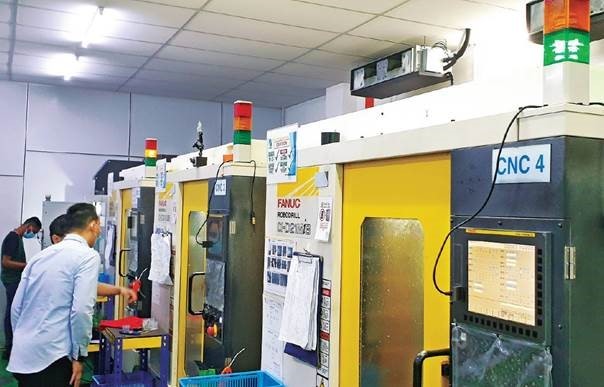
Alex Loo and Chong Choon Hau, who have experience in running factories and product development, set up Glodec Solutions Sdn Bhd in October 2019 to help small and medium enterprises (SMEs) respond to the Industrial Revolution 4.0 (IR 4.0).
They had observed that smart factory solutions could address many pain points faced by SMEs.
“There are a lot of solutions here from Europe, the UK and Australia, but they are extremely expensive,” says Loo, who is Glodec’s managing director.
The two decided to come up with an affordable made-in-Malaysia solution that catered to SMEs, giving them a chance to be part of IR 4.0.
They recruited a team of experienced senior engineers and began offering their services, which include designing smart water meters and smart factory solutions. Two products in the latter category are the smart plastic injection moulding and smart CNC (computer numerical control) machining platforms.
These solutions use sensors to identify the status of the machines and send the data to be analysed and displayed on a dashboard. This enables information transparency and allows the management to make decisions based on real-time data, says Loo.
The response from SMEs was encouraging. The team received many enquiries from companies that were eager to understand IR 4.0. The biggest hurdle, however, was the price tag.
“They understand the hype and want to know everything about IR4.0. But when they see the pricing, they will say ‘let us talk about it internally and get back to you’,” says Loo.
There was also misunderstanding of IR 4.0. “Many industry players think their automated processes are IR 4.0 but it’s actually IR 3.0. In IR 4.0, we are talking about collecting data [with sensors], connecting devices and analysing the data to improve processes,” says Chong, Glodec’s executive director.
Additionally, when the pandemic hit, the SMEs’ priorities changed. Some companies that were originally open to exploring full implementation of IR 4.0 technologies, where all the machines in the factory are connected, were not keen to do so when their businesses were affected by the pandemic.
Instead, they decided to focus on their biggest pain point. “A lot of SMEs do not put their documents in a digital form in the cloud. They [are] dependent on manual labour. During the Movement Control Order, they couldn’t even operate from home. So, they started asking for solutions to digitalise their platforms as the first step,” says Loo.
How to apply for grants
These experiences highlighted the need for Glodec to not just offer smart factory solutions but also act as a consultant to educate the SMEs on IR 4.0 and how to apply for grants.
“For instance, the Malaysia Digital Economy Corporation (MDEC) has a Digital Transformation Acceleration Programme. But it only offers up to RM500,000 [in a matching grant]. For an SME, there is not much you can do with that sum other than setting up a pilot project. We usually advise SMEs to go for the Industry4WRD grants, which can offer more than RM1 million,” explains Loo.
However, the SMEs must be aware that the Industry4WRD Domestic Investment Strategic Fund is a 60:40 matching grant, he adds. Upon approval of the grant, the company needs to first incur expenses and go through an audit by third-party certified accountants before they can be reimbursed by the government.
There are things to be considered, such as how often the company wants to be audited for the grant. “Typically, we advise them to do it once a year to save on auditing fees, because they have to engage a third-party auditor to audit and make sure their transactions are genuine before Mida (Malaysian Investment Development Authority) will reimburse the funds,” says Loo.
In the last few years, there were complaints that government incentives for automation were taking too long to be approved and that the application process was too complicated. Loo believes it is not a problem now.
“In 2019, the government introduced the Industry4WRD Readiness Assessment and appointed the Malaysia Productivity Corporation to verify or validate companies’ applications, among other responsibilities. The government is now allowing consultants like us to help interested applicants through the preparation of technical reports, selection of the right technology and setting of the right priorities,” says Loo, adding that Glodec can also assist in the implementation stage. This could speed up the process and improve the quality of the submissions.
Who should start on IR4.0?
Not every company is ready for IR 4.0. Loo believes they should implement lean manufacturing and the five S — sort, set in order, shine, standardise and sustain — to improve their business processes first.
“Otherwise, it’s not solving the root cause of your problems. You can have automation of the packaging process but if the way you handle your raw materials, trolleys and boxes is not standardised or according to a system, then automation will not address your pain point,” says Loo.
“You should tackle the low-hanging fruits first, like housekeeping of your parts, raw materials, tools and equipment, as well as [setting up a] machine maintenance programme, before going into IR 4.0.”
Glodec has three core business pillars. One focuses on product design and development, another on smart water meters and the third covers smart factory solutions.
“The final pillar is a bit slow in Malaysia but we won’t give up. We will continue to explore how we can develop in-house solutions for local companies,” says Loo.
“Going forward, we are going to boost our usage of Internet of Things devices. Software also plays a huge role in IR 4.0, especially as we want to design predictive maintenance programmes for machines. We are still learning more about it and hope to collaborate with talent to build this solution.”
Source: https://www.theedgemarkets.com/article/industry-40-getting-smes-ir40-train

